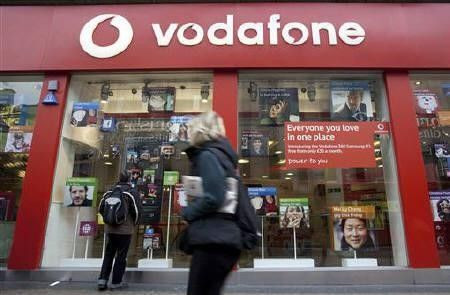Verizon Communications' Denial Of Intent To Bid For Vodafone Hammers Shares, Which Spiked On Report That Verizon Might Join AT&T In A $245 Billion Bid For Vodafone

A statement by Verizon Communications Inc. (NYSE:VZ) that it has no plans to buy Vodafone Group PLC -- despite a report from the Financial Times that the New York-based company is working with AT&T Inc. (NYSE:T) on a $245 billion offer for the British telecom -- hammered Vodafone's share price.
If such an offer were made for Vodafone, it would be the largest corporate acquisition in history. But as it turns out, there won't be any such offer, New York-based Verizon said.
"As Verizon has said many times, it would be a willing purchaser of the 45 percent stake that Vodafone holds in Verizon Wireless," a company statement said. "It does not, however, currently have any intention to merge with or make an offer for Vodafone, whether alone or in conjunction with others."
Vodafone shares on Wednesday fell 3.7 percent before paring losses around midday to approximately 2 percent.
In recent years Verizon Communications has made no secret of its desire to be the sole owner of Vodaphone's U.S. wireless business, in which it is currently the majority partner. In recent weeks there have been repeated hints that Vodafone, which owns 45 percent of Verizon Wireless, would sell that stake to Verizon Communications and, alternately, that Verizon Communications would buy out Vodafone entirely.
What is new is the possibility of a third party, namely AT&T, as the buyer of Vodafone’s other assets. That approach, plus the timing, carries some advantages over previous plans, Wall Street analysts said.
“One thing is for sure, Verizon’s valuation is high and its borrowing costs are low,” said Ronald Gruia, principal analyst with Frost & Sullivan. “Also, the dollar is strong with the dollar-pound rate is below its three-year average.”
Further, AT&T indicated an interest in Vodafone’s European assets, two-thirds of which include its operations in Britain, Germany, Spain and Italy.
On the other hand, the latest rumored approach carries a new challenge that arises from both the complexity of a three-party deal and the fact that AT&T and Verizon Communications have an intense rivalry.
“The key is whether or not they can work out the deal. Execution is the key here,” Gruia said.
Dave Novosel, an analyst with Gimme Credit, said another challenge is the prospect of damage to Verizon’s credit rating resulting from increased debt.
“There would be some equity, there would be some cash, and the majority would be debt,” Novosel said. “But that debt would mean Verizon’s credit rating could get a mid- to triple D rating. It would be a minimum downgrade of three notches and it could be four.”
He also said he didn’t see the attractiveness of Vodafone’s European assets for AT&T, especially given Europe’s worsening recession.
Late last month, before prospects for a three-way deal were being publicly vetted, Goldman Sachs analyst Tim Boddy took a somewhat more sanguine view of Vodafone in a client note that also said he continues to see the “status quo” as the more likely near-term outcome.
“Although we see scope for disappointment if no deal is announced, we still believe Vodafone remains attractive on a long-term view, given its expected improving growth momentum, a sustainable 5.5 percent dividend yield and strategic options to strengthen its position in line with accretive cable acquisitions.”
© Copyright IBTimes 2025. All rights reserved.






















